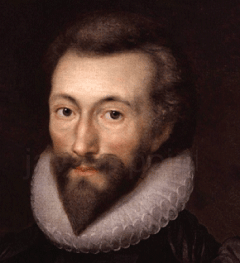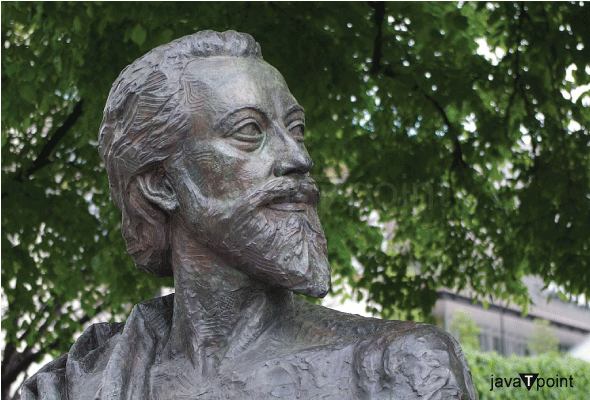John Donne
IntroductionIn 1572, John Donne was born in London, England. Samuel Johnson, an English essayist, poet, and philosopher influential in the eighteenth century, coined the term "Metaphysical Poets," which referred to John Donne. Poets belong to loosely related groups, like John Cleveland, Andrew Marvell, Richard Crashaw, and George Herbert. The Metaphysical Poets were renowned for using contradictory images, sophisticated arguments, imaginative syntax, and imagery from art, philosophy, and religion, using an extended metaphor known as a conceit to surprise the reader and inspire a fresh perspective. Donne's cautious and clever conceits boosted the interested spirit of his day by overcoming the logical and hierarchical frameworks of the seventeenth century. Donne was born during a time of religious and political conflict in England and France; on Saint Bartholomew's Day, a Protestant massacre occurred in France, while the Catholic minority in England was the target of discrimination. Born in a Roman Catholic, Donne focused much of his poetry on his stormy and passionate personal relationship with religion. He attended the universities of Oxford and Cambridge in his early adolescent years. He chose not to look for a degree at any institution since doing so would have required following the doctrine of Anglicanism, the Thirty-nine Articles. At 20, he attended Lincoln's Inn to study law. Two years later, his younger brother, imprisoned for his Catholic commitment, died. After that, he gave in to religious pressure and became an Anglican. In the 1590s, Donne produced two significant volumes of work: Satires and Songs and Sonnets, which contain most of his love poetry, romantic writing, and some sacred poems. After completing a two-year naval campaign against Spain, Donne was named Sir Thomas Egerton's private secretary in 1598. In 1601, while serving in the final Parliament of Queen Elizabeth, Donne wed Anne More, a sixteen-year-old niece of Lady Egerton. Donne's father-in-law did not approve of the marriage. He did not give the couple a dowry as a punishment and put Donne in jail for a short time. As a result, the couple was left alone and became dependent solely on their friends, family, and customers. Following his marriage, Donne experienced social and economic instability, which was made worse by the birth of multiple kids. The Divine Poems were released in 1607 after he began to write them. Donne demonstrated his thorough understanding of the Church and state rules in Pseudo-Martyr, published in 1610. Later in the year 1615, he was appointed Royal Chaplain. His wife died after giving birth to their premature twelfth child in 1617 at 33. This period of his life is linked with producing the Holy Sonnets. He was appointed dean of Saint Paul's Cathedral in 1621. Donne's writing in his last years mirrored his worry over his coming death. During a serious illness, he recorded his prayers, later published as Devotions on Emergent Occasions in 1624. He had a significant influence in London because of his insightful, charming, and creative preaching. John Donne, renowned for his colorful, engaging manner and in-depth analysis of the mortal problem, passed away in London on March 31, 1631. Donne's PoetryDonne's poetry was almost exclusively shared in manuscripts around a small circle of friends and supporters during his lifetime. Donne had no desire for his poetry to be widely read, and he hated printing them since he saw it as being beyond a gentleman. He wanted to be associated with something other than being primarily a poet or writer doing it for the money. He expressed sorrow at publishing his lengthy poems, The Anniversaries, in 1611 and 1612, saying it was a mistake "to have fallen to print anything in verse. It is difficult to accurately date most of Donne's poetry because he tended to 'publish' his poems in manuscripts. His satires, funeral poems, and some of his love poems are most likely from the 1590s from his time at Lincoln's Inn. Between his marriage in 1601 and his ordination in 1615, he most likely wrote many of his Holy Sonnets and some of his love poems. The worldly paradoxes and possibly immoral pretensions of much of Donne's devotional poetry may not be easily linked to the public perception of Donne as a sober Anglican preacher after 1615. In favor of lectures and other religious prose compositions, he published less poetry after being designated. However, one poem from 1625 still exists. The Prose of John DonneParadoxes and Problems, one of Donne's first written compositions, was possibly initiated while he was a student at Lincoln's Inn. These clever and sarcastic paradoxes explore women's inconsistency and address issues like "Why do women enjoy feathers so much?" and "Why are Courtiers more likely to be unbelievers than men in other circumstances?" Biathanatos, a casuistic explanation of suicide, was written by Donne in 1608 while he was grieving at Mitcham. He says that because of his suicidal thoughts, he has "a charitable interpretation of their Action, who dye so." Donne's 1610 publication of The Pseudo-Martyr criticizes the recusants for refusing to take the oath of allegiance to the king that Roman Catholics were required to take in the wake of the Gunpowder Plot (1605). In 1610, Donne penned a hilarious humor of the Jesuits called "Ignatius His Conclave" in Latin and English. 
The earliest of Donne's theological works, Essays in Divinity, was finished in 1611. The most enduring of Donne's prose compositions, "Devotions upon Emergent Occasions," was written in 1623 after he had recovered from a deadly illness. Each of its 23 devotions, inspired by different moments in Donne's illness, such as the entrance of the king's physician or the use of pigeons to drain vapors from Donne's head, consists of a meditation, an objection, and a prayer. The Devotions link Donne's bodily degradation to his spiritual illness until both ends when Donne hears a passing bell sound and wonders whether it is ringing for him. The Devotions, like Donne's poetry, are renowned for their dramatic intensity and various Metaphysical conceits, including the well-known "No Man Is an Island," which Donne uses to show how all Christians are one in the mystical body of Christ. But Donne's lectures best demonstrate his command of verbal expression. His son published 156 of them in three large folio editions in 1640, 1649, and 1661. Although they were written during a time of religious conflict, Donne's lectures explore the fundamental beliefs of Christianity rather than getting into religious debates. They are intelligent, funny, and emotionally touching. Donne was a master at translating biblical passages and applying them to modern situations, like the plague outbreak that destroyed London in 1625. His lectures are powerful because of their dramatic intensity, unabashed personal confessions, poetic rhythms, and startling conceits. Evolution of Donne's Poetic ReputationDonne's poetry was praised and widely wanted by readers at the time of his death, but it quickly fell out of popularity. His work could not find a large audience because, starting at the end of the 17th century, his poetry was seen as having irregular rhythmic patterns and impolite. In the nineteenth century, Donne's fame grew, and in the twentieth, poets like T. S. Eliot praised him as a proto-modernist. He is now regarded as one of the greatest English Renaissance "metaphysical" poets. Reputation and InfluenceDonne's Poems were originally published in his memory, in 1633 and 1635, after being widely copied in manuscript format. Within 90 years of Donne's passing, The Poems were well-received enough to be reprinted eight times, although his writing did not fit the cultural climate of the 18th century, when he was recognized as a great but unusual "wit." Pope appreciated Donne's intellectual abilities and used some of Donne's words in his poetry. But from the early 19th century, smart readers started to grasp Donne's artistic brilliance. Robert Browning credits Donne with giving him the idea for his theatrical monologues. Donne's poetry underwent a spectacular rebirth by the 20th century because of the innovative work of the literary historians H.J.C. Grierson and T.S. Eliot. Donne was the master of the mature Yeats and Eliot, who rebelled against the introspective lyricism of a declining romantic tradition. Donne became the hero of English-speaking poets and critics in the first half of the 20th century due to the intellectual playfulness of his poetry, his dislike for conventionally poetic images, and the dramatic realism of his style. Readers continue to find inspiration in Donne's ability to combine witty argument with passion, his dramatic delivering of complex states of mind, his daring and non-traditional imagery, and his (a little inferior to William Shakespeare's) capacity to make everyday words yield up rich poetic meaning without changing the fundamental quality of English idiom. DeathOn March 31, 1631, Donne passed away. He was buried at the historic St. Paul's Cathedral, where Nicholas Stone erected a statue in his honor bearing a Latin memorial that he most likely wrote. The memorial in St. Paul's Cathedral was one of the few items to survive the Great Fire of London in 1666. Izaak Walton claimed in his biography that the monument was based on Donne's life about his appearance at the rebirth. Such monuments became popular in the 17th century. A bust of the poet by Nigel Boonham was revealed in the cathedral churchyard outside in 2012.
Next TopicKamalika Chanda
|
 For Videos Join Our Youtube Channel: Join Now
For Videos Join Our Youtube Channel: Join Now
Feedback
- Send your Feedback to [email protected]
Help Others, Please Share









